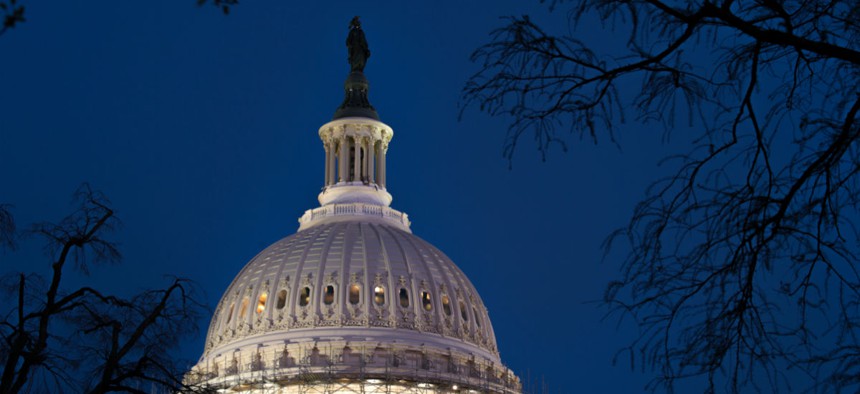
Architect of the Capitol
Is This the Worst Congress Ever?
It can’t pass a budget, can’t confirm appointments, and now it can’t even scrounge up funding to address public-health crises.
In 2011, I wrote a piece for Foreign Policy magazine about the 112th Congress; the editors helpfully titled it “Worst. Congress. Ever.” It was a bit of hyperbole, but it may be no exaggeration to call the current, 114th Congress the worst ever—at least edging out the infamous 112th. The truly cringeworthy failures started when both the House and Senate refused to even acknowledge the president’s budget, an unprecedented step, and the House and Senate Budget Committees followed by refusing to hold the usual annual hearing when the president’s top economic advisor comes to the Hill to discuss the budget and the economy. It was a sign of disrespect that was simply shocking. (Although the shock value was exceeded days later after Justice Antonin Scalia’s death.)
What about the congressional budget? Remember, back when Democrats controlled the Senate, Republican congressional leaders used to laud passing a budget as the single most significant action government could take? This time, the April 15 deadline passed without a murmur, much less an actual budget plan, from either house.
You can argue, as I have in the past, that a budget is just a symbolic document, whether it is the president’s budget, which Congress can ignore in whole or part in its own actions, or the congressional budget, set in the process in the 1974 Budget and Impoundment Control Act, not requiring a president’s signature and merely setting guidelines for Congress—often, absurd and manipulated numbers to score political points. What really matters is the spending bills and taxing bills themselves. And you can argue—as Democrats did after passage of the 2013 Ryan-Murray budget deal—that a formal budget is unnecessary since the overall guidelines were adopted in the Boehner-Obama budget deal agreed to in December 2015 right before Boehner passed the baton to Paul Ryan.
Of course, that argument was rudely rejected back in 2013 by Republicans. But more importantly, the dozen spending bills, which should be moving along with dispatch right now to meet the deadline of October 1, when the new fiscal year begins, are hardly moving at all. In the House, the Boehner budget deal was designed to “clean out the barn” for Ryan. Instead, the barn’s been soiled by the pesky Freedom Caucus, the right-most wing of the right-wing majority party. Despite Paul Ryan’s many moves to accommodate Freedom Caucus members, bringing them into the leadership fold and consulting with them regularly, they have given him the middle finger on spending bills, holding firm against any change in the sequester numbers. And that, of course, puts Ryan right where Boehner was for several agonizing years. To get the Freedom Caucus members to go along, Ryan will have to make concessions, which will lose other Republicans and allow Democrats to rip the bills apart with their own amendments. That means no bills with Republicans alone, and no stomach to bring up bills that will only pass with support from a passel of Democrats.
In the Senate, where the dollar totals are less of a sticking point, the open nature of the appropriations process means, as Brookings’ Molly Reynolds points out, that poison pill or killer amendments make passage difficult there as well. By this point in the cycle, with the sharply attenuated year that accompanies a presidential contest, with about seven weeks to go before the long summer break, the appropriations bills should be moving smartly through the pipeline—even with the procedural roadblock that is in place because there is no overall budget. After all, each has to pass the House, pass the Senate, go through a conference committee to resolve differences and get to the president—and hope there is no veto. The difficulty was underscored by the weeks and months that went by without action in the Senate on an energy and water appropriations that, unlike many other spending bills, had broad bipartisan backing—thanks to an amendment not on energy or water, but on…. Iran!
That bill finally passed the Senate last week. But the odds that most or many appropriations bills get enacted before the witching hour occurs barely more than a month before the election? Close to zero. And that means continuing resolutions, threats of partial shutdowns, and other embarrassments of governing failure.
Now add the embarrassment of the unprecedented failure of fundamental fiduciary responsibility by the Senate to even acknowledge the right of a president to nominate an individual to fill a vacancy on the Supreme Court with eleven months to go in his term, and then the obdurate refusal to hold a hearing on a nominee many key Republicans, like Orrin Hatch, had praised to the skies before his nomination, before turning him into a nonperson. It was an embarrassment from the time immediately after news broke that Justice Scalia had died, when first Senator Mike Lee and then, within an hour, Majority Leader Mitch McConnell tweeted that there would be zero consideration of an Obama nominee to replace him. The point man in this exercise, Senate Judiciary Committee Chairman Charles Grassley of Iowa, has become Obstructor-in-Chief.
The awful lapse on the Supreme Court nomination was part of a larger outrage, the failure to confirm a much larger number of nominees to both judicial and executive branch posts, a record for this Congress far more dismal than its comparable predecessors. As Mike DeBonis pointed out in The Washington Post, “Through April 30, 198 of President Obama’s nominees have won confirmation in the 114th Congress, excluding military appointments. Compare that to the 345 nominees confirmed up to that date in the final two years of President George W. Bush’s tenure, or the 286 nominees confirmed in the comparable window under President Bill Clinton.” The gaps on the executive side, which include key ambassadorships in critical countries and important posts in national security and homeland security, among others, are still overshadowed on the judicial side. There has been a huge spike in “judicial emergencies,” which are formally designated by the courts when unconscionable delays in justice are caused by heavy workloads produced via court vacancies.
Delays in congressional action, failures on fiscal policy, foot-dragging on confirmations—these are all, to one degree or another, well-worn paths of behavior in Congress. But there is more, much more, for the 114th Congress.
There are very legitimate arguments about the appropriate role and scope of the federal government. But few except nihilists and the most extreme libertarians would argue that protecting public safety in the face of catastrophe or epidemic should be off the government’s books or sharply constrained in scope. And right now, there are three such examples: the horrible Flint water debacle, a man-made (mostly state government-made) disaster; the Zika crisis, a classic disease epidemic; and the opioid crisis. All are crying out for a sharp and focused response from the federal government. In Flint, the excruciatingly slow response at all levels has left city residents still without reliably safe water supplies, while children and others face health horrors like enduring brain damage. With Zika, as Anthony Fauci of the National Institutes of Health testified, the potential for a major expansion of the virus, leading to health problems and many children born with microcephaly, along with incidents of Guillaume-Barre disease and other terrible maladies, is palpable. The opiod crisis has resulted in widespread debilitating addiction and many deaths from heroin and painkillers. Congress’s response last month? Go on recess without dealing with them.
Action on each of these epidemics requires money—and money spent now will make it much easier to avoid much bigger bills down the road, not to mention that it would abate more human suffering and death. But all three have been blocked by the Republican majority’s demand for offsets for spending to cope with disasters. And, when offsets are offered, it has still refused to come up with adequate funding.
On Zika, where the flimsy excuse is that the administration has failed to produce a detailed plan to deal with the virus (the reality is that both NIH and CDC have plans ready to roll,) the House Appropriations Committee has come up with a pathetic $600 million or so, far short of the $1.9 billion Fauci and other experts say is necessary. The same small-minded failure to find enough dollars plagues the response to the opioid crisis. In Flint, there has been next to nothing done. I expect that before the year is out, Congress will slap together something on Zika and opioids, and declare victory. Most likely, it will be too little, too late, and taxpayers will foot larger bills in subsequent years, while too many people will suffer, and too many will die.
There are many other issues awaiting congressional action, from criminal-justice reform to a bevy of bills to address the many issues surrounding mental illness. Despite the tugs and hauls of a dramatic election year, the very few days left in the congressional schedule, and the conflicts within and between the parties, some things may still be done. So the grade assigned to the 114th Congress may change some. The best we can hope for? That its leaders can bring it up to a D.







